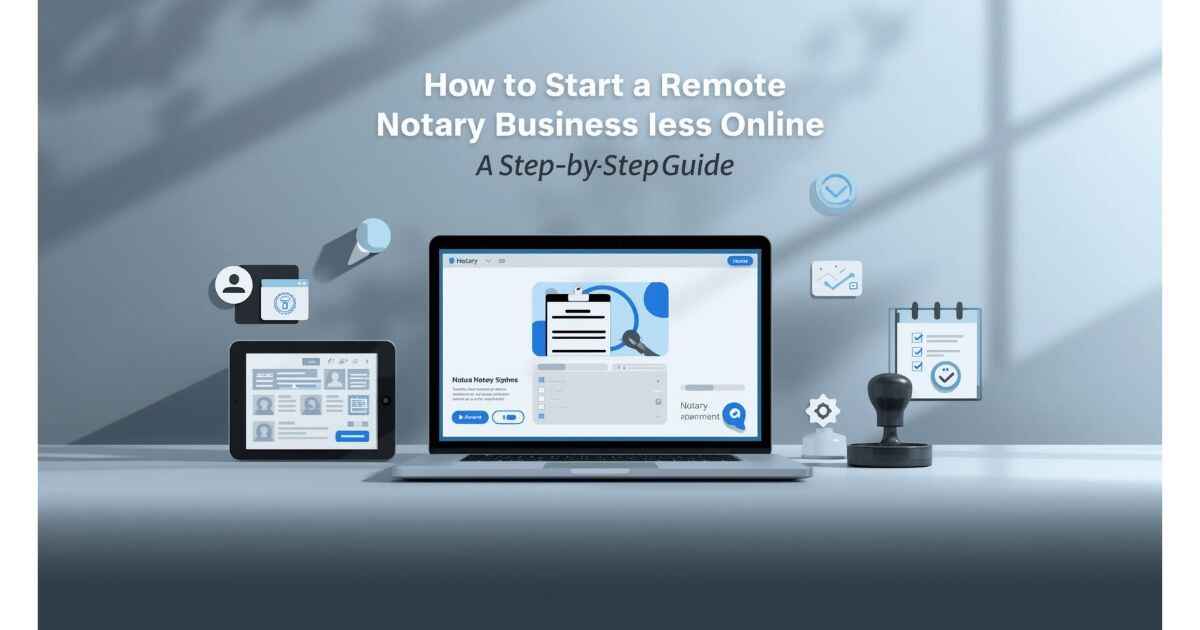Looking for the fastest way to start a remote notary business online and tap into a booming market? Here’s everything you need for instant results, whether you want to work from home, boost your income, or create new opportunities. Start a remote notary business online today; your future clients are searching right now.
Why Start a Remote Notary Business? Top Benefits That Matter
- Work Where You Want: Starting a remote notary business online means total freedom to run your business from home or on the go.
- Attract More Clients Instantly: Virtual notary services allow you to reach anyone in your state without leaving your desk. Skip local limits and maximize your client list.
- Boost Your Revenue Fast: With Remote Online Notarization (RON), you can make more per notarization and fit more appointments into your day, no driving, no waiting.
- Stay Ahead of the Competition: Start a Remote Notary Business Online now to secure your place in a rapidly growing digital market.
Quick Steps to Launch Your Remote Notary Business Online
Don’t wait, set up your remote notary business online in just a few steps:
1. Become a Commissioned Notary Public
Getting started is easy. Check and complete your state’s notary requirements, such as training, testing, and a background check, and submit your application. As soon as you’re commissioned, you’re one step closer to launching your remote notary business online.
2. Check Your State’s RON Laws
Before you start a remote notary business online, confirm your state supports RON. If yes, complete any extra RON training or applications as required. Staying compliant keeps your business running smoothly.
3. Pick a State-Approved RON Platform
Go for RON platforms like Notarize, DocVerify, NotaryCam, or Pavaso. These are built for online notaries and keep your remote notary business online, secure, and fully legal.
4. Get Your Digital Certificate and Electronic Seal
A digital certificate and e-seal are essential for any professional starting a remote notary business online. Your RON platform can help you get set up quickly, so you’re ready to notarize documents from anywhere.
5. Secure E&O Insurance
Protect your business with Errors & Omissions insurance. It’s low-cost protection every remote notary should have; don’t risk your investment.
Essential Tools to Run an Online Notary Business
Don’t let tech troubles slow you down. Here’s what every remote notary needs:
- High-quality webcam and mic for seamless online sessions.
- Fast, reliable internet to keep every virtual notary meeting on track.
- A clean, mobile-friendly website that promotes your remote notary business online and lets clients book instantly.
- Online scheduling tools (like Calendly) so you never miss an appointment.
- Secure cloud storage to protect all client files and stay organized and compliant.
Win More Clients: Marketing Tips for Remote Notaries
- Find Your Niche: Focus on real estate, wills, or business documents. Start a remote notary business online and become the recognized expert in your area.
- Build Powerful Partnerships: Reach out to attorneys, realtors, and local businesses; they all need virtual notary services.
- Boost Your Online Presence: Use “Start a Remote Notary Business Online” and other related keywords on your website, Google profile, and social media.
- Engage on Social Media: Grow your remote notary business’s online audience with quick tips and updates on LinkedIn and Facebook.
Common Challenges and How to Solve Them
- Tech Issues: Some clients aren’t tech-savvy. Send easy-to-follow instructions and guide them with confidence during each remote session.
- Different State Laws: Stay informed about state-specific rules as your remote notary business online expands. Subscribe to industry newsletters for alerts.
- Compliance: Back up every session, keep your credentials current, and safeguard records. Make trust and security your brand.
Final Thoughts
Starting a remote notary business online is the smartest move to boost your career and income today. It’s quick, profitable, and offers total flexibility. Use these simple steps and proven tips to launch, grow, and dominate your market. Ready to get started? Start a remote notary business online now and be the solution clients are searching for every day!
Frequently Asked Questions (FAQ)
What is a remote online notary?
A remote online notary performs legal notarizations over a secure video call; no in-person meetings are needed.
How much can I earn as a remote notary?
With the right marketing, starting a remote notary business online can earn you a steady side income or even a full-time six-figure potential.
Is a remote notarization legally accepted?
Yes! When you start a remote notary business online and follow your state’s RON rules, every notarization is valid and widely recognized.
What’s the difference between remote and electronic notarization?
Electronic notarization happens in person with digital tools; remote notarization is done online, with you and your client in different locations.
Jump in and start your journey. Start a remote notary business online and stand out with convenience, credibility, and modern digital expertise!
